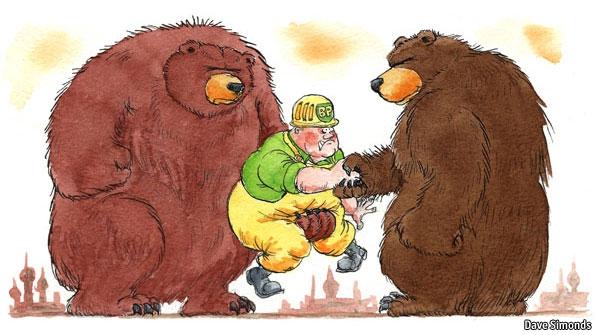
BP: UNCOMFORTABLE PLACE

On the day the U.S. barred its citizens from doing business with Igor Sechin, BP PLC's American chief executive was in an uncomfortable spot: sitting at a boardroom table with the Russian oil executive.
BP chief Bob Dudley is a director of OAO Rosneft, the state-controlled Russian oil firm where Mr. Sechin—a former government official and one of President Vladimir Putin's closest and most powerful allies— is president.
BP owns 19.75% of Rosneft, the result of a deal completed last year that the British company hoped would end a decade of tense business relationships in Russia.
Instead, the tie-up with the Kremlin-linked company creates ongoing uncertainty for BP as the U.S. tries to pressure Russia over its actions in Ukraine by sanctioning people close to President Vladimir Putin.
A U.S. Treasury Department spokeswoman said Mr. Dudley may participate in board meetings with Mr. Sechin, as long as they are covering Rosneft business and not Mr. Sechin's personal business.
"We will continue to work in whatever the appropriate manner is with Rosneft, primarily as a shareholder, but also as a partner," Mr. Dudley told analysts and investors on April 29, the day after the U.S. put Mr. Sechin on the sanctions list.
BP's commitment to remain at the table during the turmoil shows how important Russia is to the company—and comes six years after Mr. Dudley left Russia abruptly, fearing detention as an earlier BP venture soured.
For a decade now, BP's Russia projects have contributed substantial cash flow, and helped buoy the company after the 2010 Gulf of Mexico spill and explosion. In the first quarter of this year, Rosneft accounted for close to 10% of BP's profit.
But the sanctions make it politically difficult for BP to strike further deals with Rosneft to find and develop new reserves together. Such partnerships were part of BP's strategy to boost reserves and production following the 2010 spill, say people familiar with the matter.
"As a member of the board of directors, Mr.Dudley is fully engaged in the development of company's strategy," a Rosneft spokeswoman said. "Along with other board members," she said, Mr. Dudley "determines the company's charter and formulates company's policy."
One challenge for BP: While its Rosneft stake is big enough to let BP book a share of Rosneft profit, BP has little control over the state-run company.
Mr. Dudley is one of nine Rosneft directors, and must bow out of discussions on joining with other Western companies—a big part of Rosneft's expansion plans.
"It's hard to imagine Rosneft will be managed better because Bob Dudley is on the board," said a person who has worked with BP on its Russia deals. Rosneft runs with less efficiency and thicker layers of staffing than comparatively lean Western oil firms like BP.
But, this person added, with new reserves are hard to find, Western oil companies can't afford to leave Russia.
"BP is sort of stuck," the person said. "They don't have a liquid position and they can't get out. But they don't want to."
In addition to giving BP steady cash payouts, the Rosneft stake means BP gets a share of any Rosneft profit from projects with Western companies such as Exxon Mobil Corp. and Eni SpA.
BP has long been drawn to Russia's promise of substantial, under-exploited reserves. In an early move, it teamed up with Rosneft in 1998 to develop some oil fields off Russia's Sakhalin Island. But its most significant move came in 2003, when the company spent about $8 billion to create TNK-BP, a 50-50 joint venture with a group of Russian oligarchs.
As TNK-BP's CEO, Mr. Dudley instilled new business practices that helped it become one of Russia's largest oil producers.
But there was constant tension between BP and its Russian partners in the joint venture.
The Russian owners claimed BP was thwarting plans for TNK-BP to expand outside Russia. BP executives upset their partners by seeking the stability of working with a state-controlled company, rather than privately owned TNK-BP. BP bought a small stake in Rosneft when the company floated some of its shares to overseas investors.
Beginning in 2007, BP tried several times to complete deals with state-owned firms, with no success.
By late 2007, relations between Mr. Dudley and the Russian executives were breaking down. The Russian partners, including Mikhail Fridman, criticized Mr. Dudley and blocked TNK-BP's 2008 business plan.
"It's not personal, it's business," Mr. Fridman told Mr. Dudley in a meeting around that time, said a person who attended the meeting. But in the ensuing months, the Russian partners demanded Mr. Dudley's ouster. He left Russia in 2008, telling other BP executives he feared detention, and was succeeded as CEO with a Russian TNK-BP official.
BP renewed its efforts to team up with a state-controlled company in 2011 when it agreed to explore the Russian Arctic with Rosneft. TNK-BP's Russian partners blocked it in court, and Rosneft ended up teaming with Exxon in the Arctic.
Finally, BP in 2012 agreed to sell its TNK-BP stake to Rosneft for $27.5 billion in cash and shares, giving it the Rosneft ownership stake, and Mr. Dudley a place on the Rosneft board.
Despite the friction, the deal turned out well for BP—for its initial $8 billion investment, it took in about $19 billion in dividends and ended up with a chunk of cash and the stake in Rosneft.
BP in recent weeks has also maintained its public alliance with Rosneft. While a number of CEOs of prominent U.S. companies have canceled plans to attend the St. Petersburg International Economic Forum later this month, Mr. Dudley remains on the list of attendees. A BP spokesman declined to comment on Mr. Dudley's plans.
wsj.com





